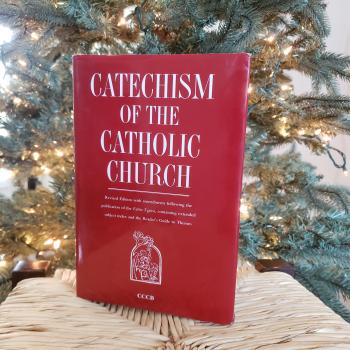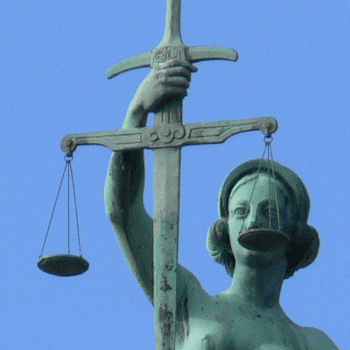On Monday, the USCCB released a statement on the ethics of COVID vaccines. It noted both the good and the bad. Bishop Kevin Rhoades, chairman of the committee on doctrine, and Archbishop Joseph F. Naumann, chairman of the committee on pro-life activities, signed the statement. This indicates the two key areas in assessing any vaccine: moral theology and pro-life work.
They posted both a news story summary and a full 7-page letter.
Here I will summarize it with some additional moral theology to help explain it.
Charity and Vaccines

The USCCB noted that taking a vaccine to prevent others from being sick is an act of charity. The two bishops state:
Receiving one of the COVID-19 vaccines ought to be understood as an act of charity toward the other members of our community. In this way, being vaccinated safely against COVID-19 should be considered an act of love of our neighbor and part of our moral responsibility for the common good.
This is not a new argument. In 2017, the Vatican said there is a “moral obligation to guarantee the vaccination coverage necessary for the safety of others.” Elizabeth Breuning had made a similar argument long before COVID was a thing.
Vaccination isn’t just about individual benefits. A belief in the common good requires individuals, at times, to take on risk for the benefit of the community as a whole. […] Widespread vaccination is not just beneficial for the vaccinated; it is especially critical for people who cannot be vaccinated, and our society doesn’t have much of a moral language for taking on personal risk for those reasons. But I think it’s a moral imperative nonetheless. By vaccinating yourself and your children, you help to create the “herd immunity” that protects the most vulnerable people in society from illness, injury and death. The lives you save, in other words, may not be your own.
I had tweeted similarly on Friday before the USCCB statement.
This vaccine is an act of charity to protect others from getting sick. FTFY https://t.co/mbD4W33tc7
— Fr Matthew Schneider LC��� (@FrMatthewLC) December 11, 2020
Divisive
Some have argued in response to both myself and the USCCB that this is divisive. They worry that this implies not vaccinating is uncharitable. First, not vaccinating is often uncharitable. However, not always. The USCCB has several lines in the document worth noting.
The bishops offer a charitable option for those who don’t want to vaccinate:
If one were to refuse vaccination, one would have a moral responsibility to undertake all the precautions necessary to ensure that one does not become a carrier of the disease to others, precautions which may include some form of self-isolation.
So not vaccinating would mean staying longer before resuming pre-COVID normal life.
For those concerned with medical issues, the USCCB makes two notes:
[First,] Nothing in this document is intended to express any opinion as to the safety or efficacy of any vaccine in general or in any particular case.
Thus, if new studies show a vaccine is dangerous or ineffective, the reason to use it dissipates. The three leading candidates all already have some decent tests showing efficacy and lack of common serious side effects. Moderna and Pfizer actually have better evidence than AstraZeneca looking at their phase III trials.
[Second,] We should keep in mind that some people cannot themselves be vaccinated; they must rely on the rest of the community’s becoming immune through vaccination so that the disease does not travel through the community and infect them.
So, the bishops are not suggesting anyone go against medical advice here.
Different Vaccines
The bishops distinguish the Moderna and Pfizer vaccines from those made by Oxford/AstraZeneca. These three vaccines are available now or soon will be while we need to wait for others. (Vaccines are available to certain populations first so most of us still need to wait.)
In view of the gravity of the current pandemic and the lack of availability of alternative vaccines, the reasons to accept the new COVID-19 vaccines from Pfizer and Moderna are sufficiently serious to justify their use, despite their remote connection to morally compromised cell lines. […] While neither vaccine is completely free from any connection to morally compromised cell lines, in this case the connection is very remote from the initial evil of the abortion.
The connection between abortion and the Moderna or Pfizer vaccines is very remote – multiple steps removed – and I covered how remote it is elsewhere. The connection is more remote than buying from Heinz or Energizer.
The AstraZeneca vaccine is more morally compromised. The HEK293 cell line was used in the design, development, and production stages of that vaccine, as well as for confirmatory testing… The AstraZeneca vaccine should be avoided if there are alternatives available.
Appropriation vs. Cooperation
What makes a test and production morally different? A test is an appropriation, which may or may not be cooperation, but production is definitely cooperation in evil.
I’ll offer an example of two tests, to show the distinction between a test that is not cooperation in evil and one that is. We know Nazis did some tests on hypothermia that would be immoral to repeat: using those tests in no way contributes to anyone repeating these tests. On the other hand, where a company repeats a test with each batch of some medicine, using that medicine would cooperate remotely in continuing the cell line used for that test.
I would note that the issue is most in production: it is undeniably cooperation in the act of keeping HEK293 going as production requires the continued use of HEK293 cells. Also, the part injected into your arm was in contact with HEK293 cells. Nonetheless, if a morally compromised vaccine, like AstraZeneca’s, is the only available vaccine, one can morally accept it.
Moderna and Pfizer used cells from the same cell line in one of their tests. This is appropriation. If they did a test once in the past, getting vaccinated is likely not even cooperation in evil: cooperation refers to contributing in some way to an otherwise preventable evil act. Nothing about that vaccination or not that vaccination contributed to the creation of a single HEK293 cell or not.
The bishops also note that death is not the only danger from COVID-19. A COVID infection can also stress the healthcare system or have long term health effects.
The USCCB also notes that using fetal cell lines in vaccines does not imply more abortions.
It is not as if the making of the vaccine required ever more cells from ever more abortions.
Other Notes
I think a few other things are worth noting in a line each. First, these two bishops, two other bishops, and leaders of 20 national Catholic organizations wrote the FDA to ask for a COVID-19 vaccine with no connection to abortion. Second, they go over the relevant Vatican documents which I have done a few times before (one example), so I won’t repeat. Third, they note some vaccines may be better for some people. It is moral to choose a vaccine based on this even if there is a less remote connection with abortion. Finally, they note we must continue to stand against abortion and we should make sure accepting these vaccines doesn’t desensitize us to abortion.
As I was about to publish this, I saw that several other US bishops had published similar statements. An archbishop got the vaccine himself to demonstrate it’s moral. A Cardinal did the same. (58 US Bishops are included here as some letters are signed by all bishops in the state.) Zero US Bishops say otherwise. Several dioceses list the USCCB statement on their site which likely means the bishops support it but that is not definitive. The California Catholic Conference wrote a letter but no bishop signatures appear so it is unclear on what authority it was published. [EDIT: this paragraph has been updated and will continue to be updated as more bishops issue concurring statements.]
In conclusion, we should seek vaccines against COVID-19. We should choose vaccines with less or no connection to abortion. We should vaccinate for our own health and out of charity for others. Vaccines save lives.
Update: CDF Statement
Not long after I posted this, the Congregation for the Doctrine of the Faith published a note approve by Pope Francis indicating such vaccines are ethical. Here’s the key line:
When ethically irreproachable Covid-19 vaccines are not available… it is morally acceptable to receive Covid-19 vaccines that have used cell lines from aborted fetuses in their research and production process.
Note: Please support me on Patreon so I can keep writing like this. If I get 2 more at the $12 level by Christmas, I’ll send you all a special gift.












